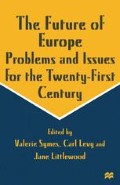Abstract
The obsession in the European Union (EU) with the issue of whether or not it conforms to some ideal type of a liberal-democratic, representative polity believed to typify contemporary West European regimes is honorable and symptomatic of the extent to which the concept of the EU and working within it has become entrenched in the minds of government and non-government actors as well as the public in the Member States. That efforts should be undertaken to make the emergent EU polity conform to liberal, democratic practice based on open, transparent, accountable and representative (if not altogether efficient) government is laudable. It is also a response to two forces: prospective enlargement to states with totalitarian traditions; and the growth of cynicism and disaffection from political processes among the populace of the EU’s Member States.
Access this chapter
Tax calculation will be finalised at checkout
Purchases are for personal use only
Preview
Unable to display preview. Download preview PDF.
References
Closa (1992), ‘The Concept of Citizenship in the Treaty on European Union’, Common Market Law Review, No. 29, pp. 1147–69.
Commission Européene (1995), Rapport sur le functionnement du traité sur l’ Union Européenne, 10 May, Brussels.
Conseil et Etats membre réunis au sein du Conseil (1991), ‘Résolution sur les Droits de l’Homme, la Démocraties et le Développement’, Bulletin of the European Communities, 28 November, 11.
Conseil européen de Copenhague (1978), ‘Déclaration sur le Democratie’, Bulletin of the European Communities, 8 April, 4.
Conseil européen de Dublin (1990), ‘Déclaration sur l’Antisémitisme, le Racisme et la Xénophobie’, Bulletin of the European Communities, 25–26 June, 6.
Conseil européen de Luxembourg (1991a), ‘Déclaration sue les Droits de l’Homme’, Bulletin of the European Communities, 28–29 June, 6.
Conseil européen de Maastricht (1991b), ‘Déclaration sur le Racisme et la Xenophobie’, Bulletin of the European Communities, 9–10 December, 12.
Corbett, R. (1993), The Treaty of Maastricht, Longman, London.
Council Secretariat (1994), Berlin Declaration of Increased co-operation in Combating Drug Crime and Organised Crime in Europe, Berlin 8 September, Brussels.
European Parliament (1995), European Parliament Working Document, B4–348/95.
Lodge, J. (1992), Internal Security and Judicial co-operation Beyond Maastricht, ECRU, Hull University.
Lodge, J. (1994), ‘Transparency and Democratic Legitimacy’, Journal of Common Market Studies, September pp. 343–68.
Lodge, J. (1995), Institutional Affairs, Discussion Paper No. 3 by the Jean Monnet Group of Experts in the series, The European Union and the 1996 IGC — Crisis or Opportunity?, May, Centre for European Union Studies and the Representation of the European Commission in the UK, London.
Lodge, J. (1995a forthcoming), ‘Democratic Legitimacy and the EC: Crossing the Rubicon’, International Journal of Public Administration.
Millar, D. (1995), Constitutional Issues: The European Parliament and National Parliaments, Discussion Paper No. 2 by the Jean Monnet Group of Experts in the series, The European Union and the 1996 IGC: Crisis or Opportunity?, May, Centre for European Union Studies and the Representation of the European Commission in the UK, London.
Parlement Européen (1989), ‘Déclaration sur les Droits et Libertés Fondamentaux’, 12 April. Journal Officiel, C120, 16 May.
Parlement Européen (1994), Le Parlement Européen et Les Droits de l’ Homme, Brussels.
Parliament Européen, Conseil et Commission (1977), ‘Déclaration Commune sur les Droits Fondamentaux’, Journal Officiel, C103, 27 April.
Schermers, H.G. (1990), ‘The European Communities Bound by Fundamental Human Rights’, Common Market Law Review, No. 27, pp. 249–58.
Editor information
Editors and Affiliations
Copyright information
© 1997 Palgrave Macmillan, a division of Macmillan Publishers Limited
About this chapter
Cite this chapter
Lodge, J. (1997). The Emergent European Union: Democratic Legitimacy and the 1996 Inter-governmental Conference. In: Symes, V., Levy, C., Littlewood, J. (eds) The Future of Europe. Palgrave Macmillan, London. https://doi.org/10.1007/978-1-349-25379-1_14
Download citation
DOI: https://doi.org/10.1007/978-1-349-25379-1_14
Publisher Name: Palgrave Macmillan, London
Print ISBN: 978-1-349-25381-4
Online ISBN: 978-1-349-25379-1
eBook Packages: Palgrave Political & Intern. Studies CollectionPolitical Science and International Studies (R0)

